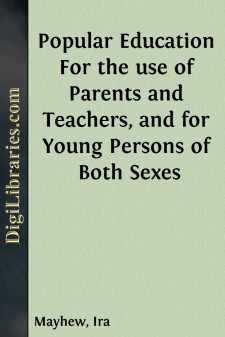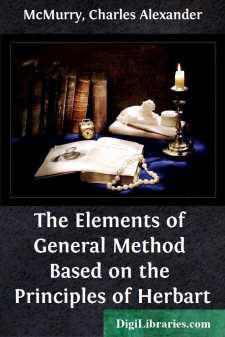Education
Education Books
Sort by:
by:
Harry Best
INTRODUCTION Society as a whole knows little of the deaf, or the so-called deaf and dumb. They do not form a large part of the population, and many people seldom come in contact with them. Their affliction to a great extent removes them from the usual avenues of intercourse with men and debars them from many of the social activities of life, all tending to make the deaf more or less a class apart in...
more...
A Preliminary Survey of the Task Before the School When people come to think alike, they tend to act alike; unison in thinking begets unison in action. It is often said that the man and wife who have spent years together have grown to resemble each other; but the resemblance is probably in actions rather than in looks; the fact is that they have had common goals of thinking throughout the many years...
more...
by:
Ira Mayhew
Who is sufficient for these things? is a question which any one may well ask when sitting down to the preparation of a treatise on popular education. The author of this work would have shrunk from the undertaking, but from deference to the judgment of the honorable body that unanimously invited its preparation. He has also been encouraged not a little by many kind friends, one of whom, distinguished...
more...
I To what a great extent men are ruled by pure hazard, and how little reason itself enters into the question, is sufficiently shown by observing how few people have any real capacity for their professions and callings, and how many square pegs there are in round holes: happy and well chosen instances are quite exceptional, like happy marriages, and even these latter are not brought about by reason. A...
more...
THE CHIEF AIM OF EDUCATION. What is the central purpose of education? If we include under this term all the things commonly assigned to it, its many phases as represented by the great variety of teachers and pupils, the many branches of knowledge and the various and even conflicting methods in bringing up children, it is difficult to find a definition sufficiently broad and definite to compass its...
more...
IDEALS. A noble aim,Faithfully kept, is as a noble deed.Wordsworth. To few men does life bring a brighter day than that which places the crown upon their scholastic labors, and bids them go forth from the halls of the Alma Mater to the great world's battlefield. There is a freshness in these early triumphs which, like the bloom and fragrance of the flower, is quickly lost, never to be found again...
more...
THE POINT OF VIEW There is an endless, and perhaps worldwide, controversy as to what constitutes the "essentials" of education; and as to the steps to be taken in the teaching of these essentials. The safe plan for constructive workers appears to be to avoid personal educational philosophies and to read all the essentials of education within the needs and processes of the community itself....
more...
CHAPTER I TEACHING SCHOOL Life and living compared.—There is a wide difference between school-teaching and teaching school. The question “Is she a school-teacher?” means one thing; but the question “Can she teach school?” means quite another. School-teaching may be living; but teaching school is life. And any one who has a definition of life can readily find a definition for teaching...
more...
CHILDREN AND THEIR BOOKS The most vital educational problem will always be how to make the best use of the child's earlier years, not only for the reason that in them many receive their entire school training, but also because, while the power of the child to learn increases with age, his susceptibility to formative influences diminishes, and so rapid is the working of this law that President...
more...
There has been a great improvement in the physical condition of the people of the United States within two generations. This is more noticeable in the West than in the East, but it is marked everywhere; and the foreign traveler who once detected a race deterioration, which he attributed to a dry and stimulating atmosphere and to a feverish anxiety, which was evident in all classes, for a rapid change...
more...











